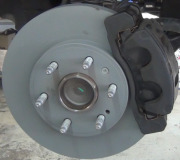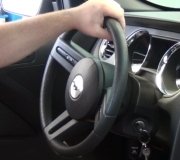If the brakes release when you loosen the lines at the master cylinder, that is where fluid is being trapped. There's only three possible causes. If the problem started only after the master cylinder was replaced, chances are the push rod in the power booster is adjustable and it's adjusted too long. The second problem is if the brake light switch is misadjusted and is holding the brake pedal down a little. Either cause will hold the pistons and lip seals in the master cylinder in the applied position and prevent brake fluid from returning to the reservoir. As the brakes and brake fluid heat up, the fluid expands and applies the brakes even harder. You can verify these two conditions by loosening the mounting nuts that hold the master cylinder to the booster. Pull the master cylinder forward about 1/8" and the brakes will release.
The third condition is the contaminated brake fluid. All the rubber parts that contact brake fluid will grow and become mushy. The lip seals will grow past the fluid return ports and block them. Loosening the steel lines will let the brakes release, just like with the other two causes, but in this case loosening the master cylinder from the booster will not let the brakes release. The only proper fix for this is to remove every part that has rubber that contacts the brake fluid, flush and dry all the steel lines, then install the new parts. That means replacing the wheel cylinders, rubber flex hoses, combination valve, bladder seal under the reservoir cap, and the new calipers and master cylinder. If any part with rubber is not replaced, the contamination will leach out and recontaminate the entire system again. The clue here, besides not being able to reseat the bladder seal in the reservoir cap, is the brakes may seem okay for up to a week after replacing the master cylinder, but then the problem returns once the new master cylinder is contaminated.
Tuesday, February 11th, 2014 AT 5:54 PM



